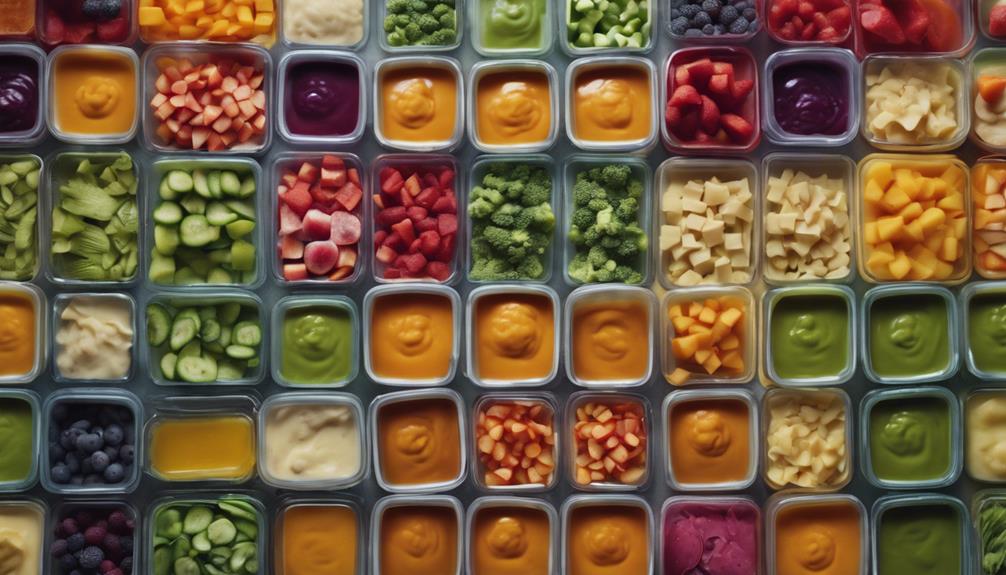To handle a food thrower, start by establishing consistent mealtime routines that give your child a sense of security. Support emotional regulation by calmly responding and encouraging them to express feelings. Manage the behavior by calmly removing the food without anger and praising positive actions. Stay consistent in your responses to help your child understand expectations. Involving your child in routines or choices can also reduce frustration. If you keep these strategies in mind, you’ll discover more ways to turn mealtime struggles into success.
Key Takeaways
- Stay calm and respond with a firm, gentle reminder that throwing food is not acceptable.
- Remove the plate calmly without reacting angrily, and explain the behavior briefly.
- Reinforce positive behaviors by praising children when they sit nicely or express feelings appropriately.
- Offer choices during mealtime to give children a sense of control and reduce frustration.
- Establish consistent routines to create predictability, helping children feel secure and less likely to act out.

Food throwing can be a frustrating behavior to manage, but understanding effective strategies can make a difference. When your child starts tossing food during mealtime, it’s easy to feel overwhelmed or at a loss. However, establishing consistent mealtime routines and supporting your child’s emotional regulation can considerably reduce these incidents. Routines help create a predictable environment where your child knows what to expect, making them feel more secure and less likely to act out. For example, having a set start time, clear expectations, and a consistent sequence of activities during meals helps your child understand boundaries. When mealtime becomes a familiar routine, it minimizes confusion and frustration, which are often triggers for food throwing.
Supporting your child’s emotional regulation is equally important. Often, food throwing is a way for children to express feelings they can’t yet verbalize. If your child is upset, overwhelmed, or tired, they may throw food as a form of communication or to seek attention. Recognizing these emotional cues allows you to respond calmly and help them manage their feelings. Encourage your child to identify and express their emotions through words or gestures, which can reduce their need to act out physically. For instance, if your child seems frustrated, you might say, “I see you’re upset. Let’s take some deep breaths together.” By validating their feelings and teaching them healthy ways to cope, you foster emotional regulation and decrease food throwing episodes.
Encourage your child to express emotions verbally to reduce food throwing and promote emotional regulation.
When managing food throwing, consistency is key. If your child throws food, calmly remove the plate without making a fuss, and explain that throwing food isn’t acceptable. Avoid reacting with anger or punishment, which can escalate the behavior. Instead, stick to a calm, firm response, emphasizing that mealtime is a positive experience. Reinforce good behavior with praise when they sit nicely or use appropriate words to express their feelings. Over time, this consistency helps your child learn what is expected and understand that throwing food isn’t a way to get attention or express needs. Additionally, understanding that establishing predictable routines can foster a sense of security is crucial for reducing stress during meals.
Finally, offering choices and involving your child in mealtime routines can empower them and reduce frustration. Let them decide between two healthy options or help set the table. When they feel a sense of control, they’re less likely to act out. Remember, managing food throwing is a process that requires patience and understanding. By focusing on establishing predictable routines, supporting emotional regulation, and maintaining consistency, you can create a more positive mealtime environment and diminish food throwing behaviors.
Frequently Asked Questions
How Can I Prevent My Child From Throwing Food in the First Place?
To prevent your child from throwing food, you need to set clear boundaries and expectations at mealtime. Calmly explain that throwing food isn’t acceptable and stick to consistent rules. Use positive reinforcement by praising good behavior and offering encouragement when they stay seated and keep their hands to themselves. With patience and consistency, your child will learn appropriate mealtime manners and understand the boundaries you’ve set.
What Are Effective Ways to Calm a Child During a Food Throw?
When your child starts throwing food, try calming techniques like gentle, soothing voice and deep breaths to help them settle down. Use distraction methods such as offering a favorite toy or changing the scenery to shift their focus. Stay calm yourself, as your reaction influences their behavior. By calmly addressing the situation with these strategies, you can help your child feel secure and reduce mealtime misbehavior.
How Do I Handle Food Throwing in Public Settings?
Did you know that 65% of parents say public mealtime etiquette challenges are their biggest struggle? When your toddler tantrums with food throwing in public, stay calm and firm. Gently but consistently remind them of good manners, like keeping food on the plate. Distract with a favorite toy or snack, and avoid embarrassing reactions. Your steady response teaches your child appropriate behavior during those tricky moments.
Are There Any Long-Term Consequences of Ignoring Food Throwing?
Ignoring food throwing can lead to long-term habits where your child sees misbehavior as acceptable, reinforcing the behavior over time. It may also impact their developmental progress by delaying learning appropriate ways to express frustration or needs. If you overlook these episodes, your child might not develop healthy boundaries or self-control, affecting future social interactions. Addressing food throwing consistently helps foster better habits and supports their overall development.
When Should I Seek Professional Help for My Child’s Mealtime Behavior?
You might wonder if seeking help is necessary for your child’s mealtime behavior. If their food throwing persists despite consistent boundaries, or if you notice signs of feeding disorders or delays in child development, it’s time to consult a professional. Early intervention can address underlying issues and improve mealtime experiences. Don’t hesitate to seek guidance if your child’s behavior markedly impacts their nutrition or development.
Conclusion
Remember, staying calm and consistent is key. For example, if your child throws food during mealtime, calmly remove the plate and explain that throwing isn’t okay. Over time, this teaches boundaries without creating power struggles. By applying these strategies—like setting clear expectations and offering choices—you’ll create a more positive mealtime environment. Keep patient and firm, and soon your child will learn appropriate behavior, making mealtime enjoyable for everyone.










